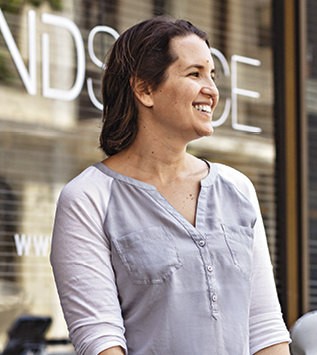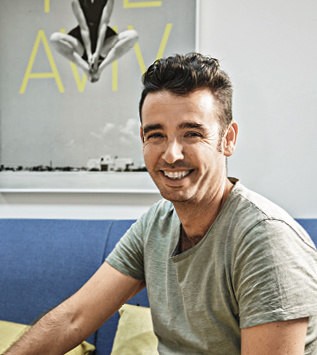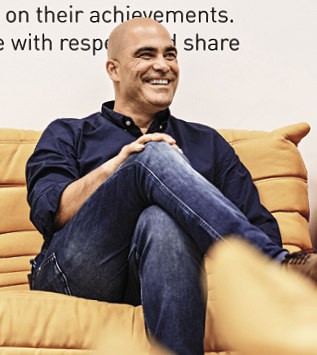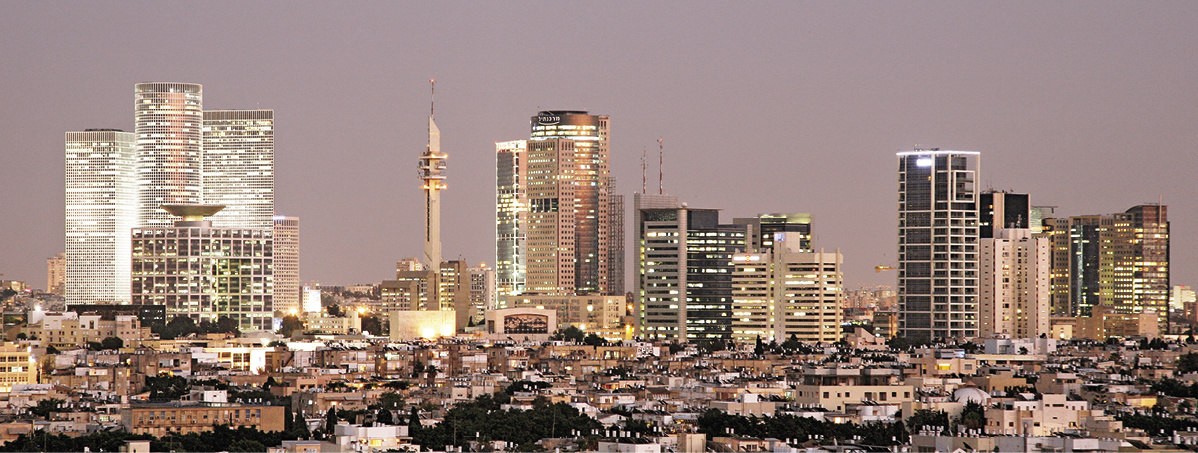
Silicon Wadi
Audi sees many factors driving the future of mobility—tailored digital solutions, for instance. With Gett, a start-up founded in Tel Aviv, the brand with the four rings has an exciting partner on board. However, there are other reasons why this Mediterranean metropolis is one of the most fascinating start-up hot spots.
Philipp Kohlhöfer (copy) & Yadid Levy (photo)
Libby Alpert heads up the marketing division at Mindspace, one of several dozen providers of co-working spaces now operating in Tel Aviv. “Tel Aviv is a fast-paced city and the entire office is one big networking machine,” she explains.
21 start-ups per square kilometer in Tel Aviv, say the statistics.
There are certain numbers that are supposed to explain why Tel Aviv is called Silicon Wadi, in reference to its namesake in California: 1,500 start-ups, 21 per square kilometer—or one for every 321 inhabitants. Added to this are some fifty co-working spaces and the same number of research centers of international enterprises such as Google, Samsung and Microsoft. The city boasts the highest number of patent registrations per head of population in the western world, with the IT sector accounting for forty percent of these. But perhaps this doesn’t explain anything. Perhaps other figures would be more informative. Days of sunshine per year, for example: 318. Kilometers of white sandy beaches: 14. Bars, clubs and restaurants packed into an area of 70 square kilometers: 1,748. Free wifi on every city bus and every section of beach. Almost one third of the population is below 35 years of age. There are more than 100,000 students out of a population of 481,000. Over half, namely 57 percent, of the residents are well educated. Moreover, everyone seems to own either a skateboard or a surfboard—which they use every day.
“Well,” says Mark Oun, 39, “right now, I only surf on weekends.” Oun is CEO of Gett Israel, a company providing on-demand mobility services in over 60 cities worldwide—including New York, London and Moscow. Gett only works with traditional, licensed taxi drivers, not with freelance part-time drivers. The business works in spite of this. Or precisely because of it. “Tel Aviv is a fertile city for innovation,” Oun says. He cites the high proportion of early adopters here who are very receptive to technology, which is obvious in the quality of employees. Most of them work in R&D. Oun stands in the lounge. It is late and a delivery service has just arrived with dinner. Many of the employees are still here. “We like to try things out,” he says, referring to both Gett and Tel Aviv. How much of Tel Aviv’s spirit is in Gett? Oun grins. “We are still a start-up—and we want to keep it that way.” Presumably, he is referring to both Gett and Israel. He goes on to explain that the atmosphere tends to be cooperative rather than confrontational. “We like to listen,” he says finally. He sees the Gett mission as aligning innovation with people’s needs. And just getting down to work. If people make mistakes, so be it. “It’s not the end of the world,” and ultimately it results in improvement. “The product is updated every two weeks.”
He’s talking about Gett, but could just as well be referring to Tel Aviv. New start-ups are continuously being created, some are shut down again—only for the entrepreneurs to re-emerge again with a new idea. At Gett, Oun explains, employees start out thinking they are working in the taxi business—an old school concept in a new guise. “But after a short time, all they talk about is algorithms.” That is because the real investment is not in transporting people or goods, which of course is being continuously refined, but in the technology. The infrastructure. The data.

The Audi Q3 blends with the cityscape: young, dynamic, flexible. Tel Aviv places great emphasis on mobility. People have long since recognized the importance of data as the link between mobility and the future.
In fact, Israel’s success in the technological field is based on infrastructure. Or rather, on the lack of infrastructure with its neighbors. Given the dormant state of trade with countries in the region, entrepreneurs have no option but to look further afield. “Nobody programs anything in Hebrew,” says Gilad Uziely. “The market is far too small.” Besides, Israel is scarcely a gateway to the Middle East. “In any event, that is not why people invest in technology here.” Uziely, 35, is Director of Economic Development, with responsibility for advancing Tel Aviv’s start-up scene. He reports directly to the mayor’s office. He also knows what he is talking about because he manages two start-ups of his own on the side. “We think internationally and in terms of technology because we have no choice.” And he means this quite literally.
Even before the Six-Day War of 1967, the Israeli Defense Forces had set up Mamram and Unit 8200, two units dedicated solely to acquiring data. By the 1980s, when software finally became more important than hardware, the Israelis were well positioned to take advantage of this trend. Countless former soldiers have learned how to develop creative technological solutions under constant pressure, while still in their early twenties. They then apply this expertise in their civilian careers. Their products are not generally aimed at specific end users, but focus instead on the big picture. For example, the first firewall was programmed in Israel, as was the first messenger service. These innovations were followed by the USB stick and the first software to format data in a way that benefits companies. The founders of these companies all served with one of these two units.
“That’s the first thing,” says Uziely. He sits in an office no bigger than that of a start-up in its first week of existence. Space is tight, the coffee machine is the most used item, the sofa in the conference room is worn, colleagues eat, sleep and breathe their work. Uziely leans back. Then there was the immigration, he continues. Following the collapse of the Soviet Union, large numbers of emigrants wanted to settle in Israel. Instead of closing its borders, Israel made every effort to assimilate the new arrivals as quickly as possible—and the Office of the Chief Scientist, a dedicated department in the Ministry of Economy, devoted itself entirely to this task. This strategy soon paid dividends, as many of the immigrants were highly skilled. As early as 1998, the U.S. periodical Newsweek had singled out Tel Aviv as one of the world’s most technologically influential cities.

“Nobody programs anything in Hebrew.” According to Gilad Uziely, 35, Director of Economic Development with responsibility for advancing Tel Aviv’s start-up scene, everything is focused on the international stage. Think global!
300 Mio. dollars is the sum Volkswagen Group has invested in Gett and the future of mobility.


With the high-tech companyMobileye, Audi also has a partner in Tel Aviv for the development of piloted driving. The brand with the four rings uses the highly sophisticated 3D camera technology.

Creativity requires freedom: 318 days of sunshine per year, 14 kilometers of sandy beaches, free wifi on every city bus and every section of beach make working in Tel Aviv an attractive proposition.

Mark Oun is CEO of Gett Israel. The company now provides on-demand mobility services in over 60 cities worldwide—including New York, London and Moscow.
100,000 of Tel Aviv’s population of around 500,000 are students.
The Office of the Chief Scientist still exists today. It continues to promote the technology sector by providing funding and the relevant infrastructure—under one condition. The company founders and subsequent investors can do what they wish with a subsidized company, and can even relocate the head office abroad, but the R&D department must remain in Israel. Uziely says, “Apart from this, we have constant sunshine, which certainly helps.” He laughs. On a more serious note, he adds, “We want to be the Oxford of start-ups.” Those who want to learn come to Tel Aviv, he says, adding that this ambition is already becoming reality in a city that provides constant access to companies and politicians. In the end, he says, it’s all about the three Ts: “talent, tolerance, technology.” You cannot have one without the others. “I help you today; you help me tomorrow.” That’s how it goes in Tel Aviv.
“That is certainly the idea behind Mindspace,” chimes Libby Alpert. She previously worked with Global Marketing Operations at Gett and now heads up the marketing division at one of the several dozen providers of co-working spaces now operating in Tel Aviv. Mindspace is a little bit hipper than its competitors, “and we are more than an office community.” While Mindspace embraces the typical attributes of co-working spaces—high levels of flexibility, excellent equipment, collaboration—its numerous tenants who program apps also come up with other ideas. Such as that of Noam Levy. His company NeoTop Water Systems manufactures small plastic balls that prevent water in open reservoirs from evaporating. Everyone in Tel Aviv is very focused on success, says Alpert. This can be gauged from the average duration of tenancies. Entrepreneurs usually spend around twelve months with their start-ups at Mindspace. After that, they either have become too big or have gone bust. People try things out, fail, and start from scratch again a little bit wiser. “That is part of our culture.” There are allegedly even investors in Israel who refuse on principle to invest in an entrepreneur’s first idea—believing that failure is the only way that people grow. “Tel Aviv is a fast-paced city and the entire office is one big networking machine,” says Alpert.
Following new ideas. Setting up new companies. Looking to international markets. These are essentially old ideas. When Tel Aviv was founded in 1909, the objective was to construct no less than “a new Manhattan” on the strand. Perhaps that’s what it is: Tel Aviv itself is one huge start-up. To this day.
